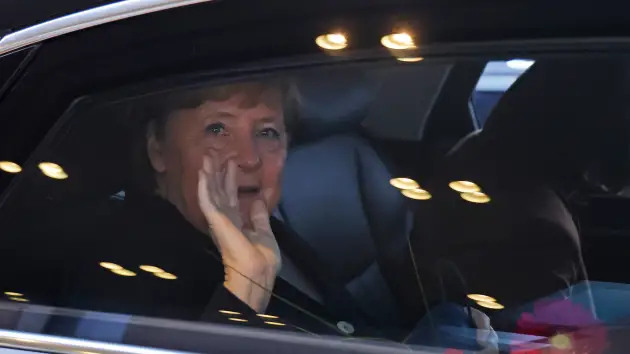With Putin’s war in Europe, the legacy of Germany’s Merkel is now being seen in a very different light
CNBC – The former German leader was known for speaking Russian and keeping diplomatic ties with Russia’s President Vladimir Putin. It was also during her term that Germany stepped up its energy links to Moscow and kept its national defense spending to a minimum.
- The former German leader was known for speaking Russian and keeping diplomatic ties with Russia’s President Vladimir Putin.
- It was also during her term that Germany stepped up its energy links to Moscow and kept its national defense spending to a minimum.

Sean Gallup | Getty Images News | Getty Images
With Vladimir Putin’s unprovoked attack against Ukraine, political analysts are now reassessing the long and deeply complicated relationship the Russian leader had with ex-German Chancellor Angela Merkel, and how Moscow came to hold so much sway over the rest of Europe.
The former German leader was known for speaking Russian and keeping diplomatic ties with Putin. It was also during her term that Germany stepped up its energy links to Moscow and kept its national defense spending to a minimum.
But, Russia’s invasion of Ukraine has now led to a dramatic shift in German politics.
New Chancellor Olaf Scholz’s “forceful policy shifts is a firm repudiation of the core of Merkel’s foreign economic policy,” Jacob Kirkegaard, a senior fellow at the German Marshall Fund think tank, told CNBC via email.
“Germany’s foreign economic policy is no longer predicated on ‘Russia being a stability oriented actor,’ but instead an aggressive imperialist power,” Kirkegaard added.
Scholz announced a halt on the Nord Stream 2 gas pipeline after Russia’s first military moves into two breakaway regions of Ukraine in late February. Nord Stream 2, which started being built in 2018 during Merkel’s chancellorship, is seen as a controversial project which was meant to bring additional gas from Russia to Germany via the Baltic Sea, circumnavigating counties like Ukraine and Poland.
Merkel’s “big failure” was not reversing those economic links and energy projects in the wake of Moscow’s illegal annexation of Crimea in 2014, said Daniela Schwarzer, executive director for Europe and Eurasia at the Open Society Foundations think tank.
In fact, Merkel kept her backing for the gas pipeline in place, despite concerns from Ukraine and other countries, notably the U.S. The German chancellery was not immediately available for comment when contacted by CNBC Monday.
Germany’s gas imports from Russia amounted to around 36% of its total in 2010, which rose to a roughly 65% share by 2020, according to figures from Eurostat.
Alberto Alemanno, a professor of EU law at H.E.C. Paris Business School, said:
“No other country has downplayed Russia’s rebellious stance towards the world order as Merkel’s Germany.”
Alberto Alemanno
It is Nord Stream 2 which epitomizes Merkel’s appeasement approach towards Russia, to the point of embodying today all what was wrong with Germany’s stance towards Russia. By establishing an unnecessary relationship of interdependence with Vladimir Putin, Merkel’s Germany made him stronger while weakening the whole of Europe and NATO,” Alemanno added.
Scholz initially appeared careful with his stance toward Nord Stream 2 since he took power in December. However, as tensions with Russia worsened, he announced a halt on the certification of the pipeline as many political analysts had been expecting.
More recently, as Russia advanced its invasion of Ukraine, Scholz said Berlin would be sending weapons to Ukraine and would be stepping up government investments on defense. The move signaled a major shift in a German defense policy that’s been in place since the end of World War II that prevented the exporting of locally made weapons to conflict zones.
“Merkel underspent,” Schwarzer said, both toward NATO and the EU. “Part of the [new] money is not a new strategy, but the recognition that we need to do more,” she said, noting that the German army is “in a bad shape.”
Open door to refugees
But there is one area where Merkel’s legacy is still intact: welcoming refugees. Merkel will always be reminded for her stance back in 2015 at the height of a massive influx of refugees into Europe, when she implemented an open-door policy to those fleeing war from countries like Syria.
“Merkel’s very clear and open position on Syrian refugees led to a strong societal engagement in Germany,” Schwarzer from Open Society Foundations said, adding that this policy was now supporting the reception of Ukrainian refugees too.
According to the United Nations Refugee Agency, more than 2 million people have now fled Ukraine. Although they are arriving primarily to the countries closest to Ukraine, some have also moved on to Germany, where locals have been offering shelter and support.
More broadly, Schwarzer also said there was another part of Merkel’s legacy still very much intact. Merkel, who grew up in Communist East Germany, was seen as the de-facto leader of the West during Donald Trump’s tenure at the White House, with critics highlighting that America’s position on the global stage diminished somewhat with Trump as president.
Schwarzer said that Scholz has built on this idea, saying he “says the same things but in a more concrete way.” “This sense of responsibility is a continuity,” she added.